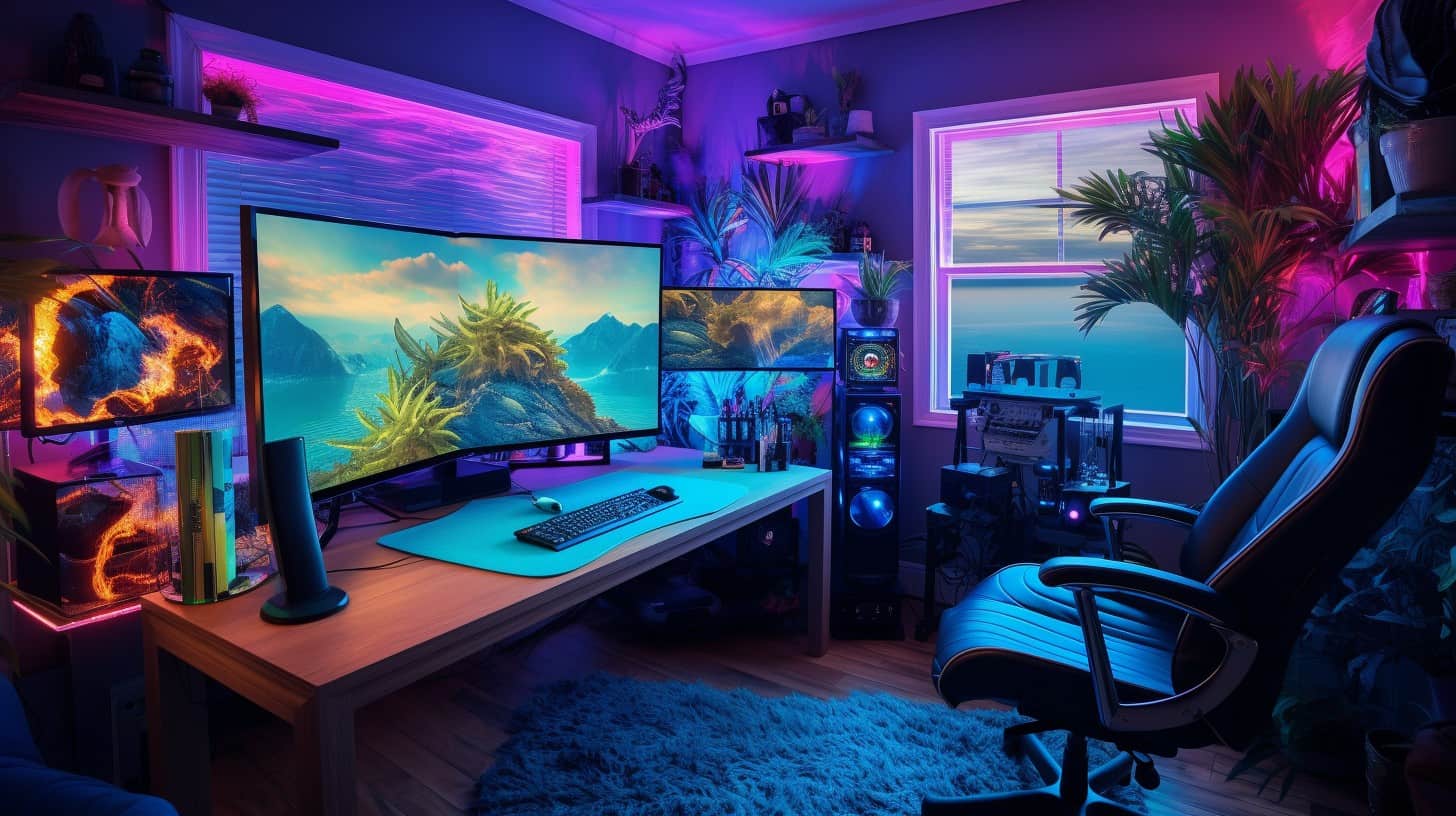Have you ever found yourself sitting at your desk, the glow of computer screens casting long shadows into the corners of your room, feeling that all-too-familiar sense of fatigue? Trust me, when even our most beloved geeky interests start to feel like a grind, it’s clear we’re in desperate need of a fresh digital wind.
Let’s journey together through virtual landscapes, seeking out those hidden computer hobbies. They don’t just promise realms of fun; they open doors to new skills and ignite that creative spark within us.
So come along—let’s uncover an exhilarating online hobby to rekindle our passion for the pixelated wonders that await!
Key Takeaways
Computer hobbies like gaming, coding, and graphic design are good for relaxing and can also make you smarter by improving problem-solving skills.
If you get really into a computer hobby, there’s a chance to earn money doing things like streaming games, selling digital art, or teaching online.
To start a computer hobby, you need some basic stuff like a good computer and maybe special software, depending on what you’re into. Fast internet helps too!
There are many free or paid learning resources online that can help teach skills for different hobbies, from YouTube tutorials to full courses on sites like Coursera.
Joining online communities is great because they offer support and answers to your questions, whether you’re a gamer figuring out strategies or a coder stuck with programming problems.
Table of Contents
Popularity and Benefits of Computer Hobbies
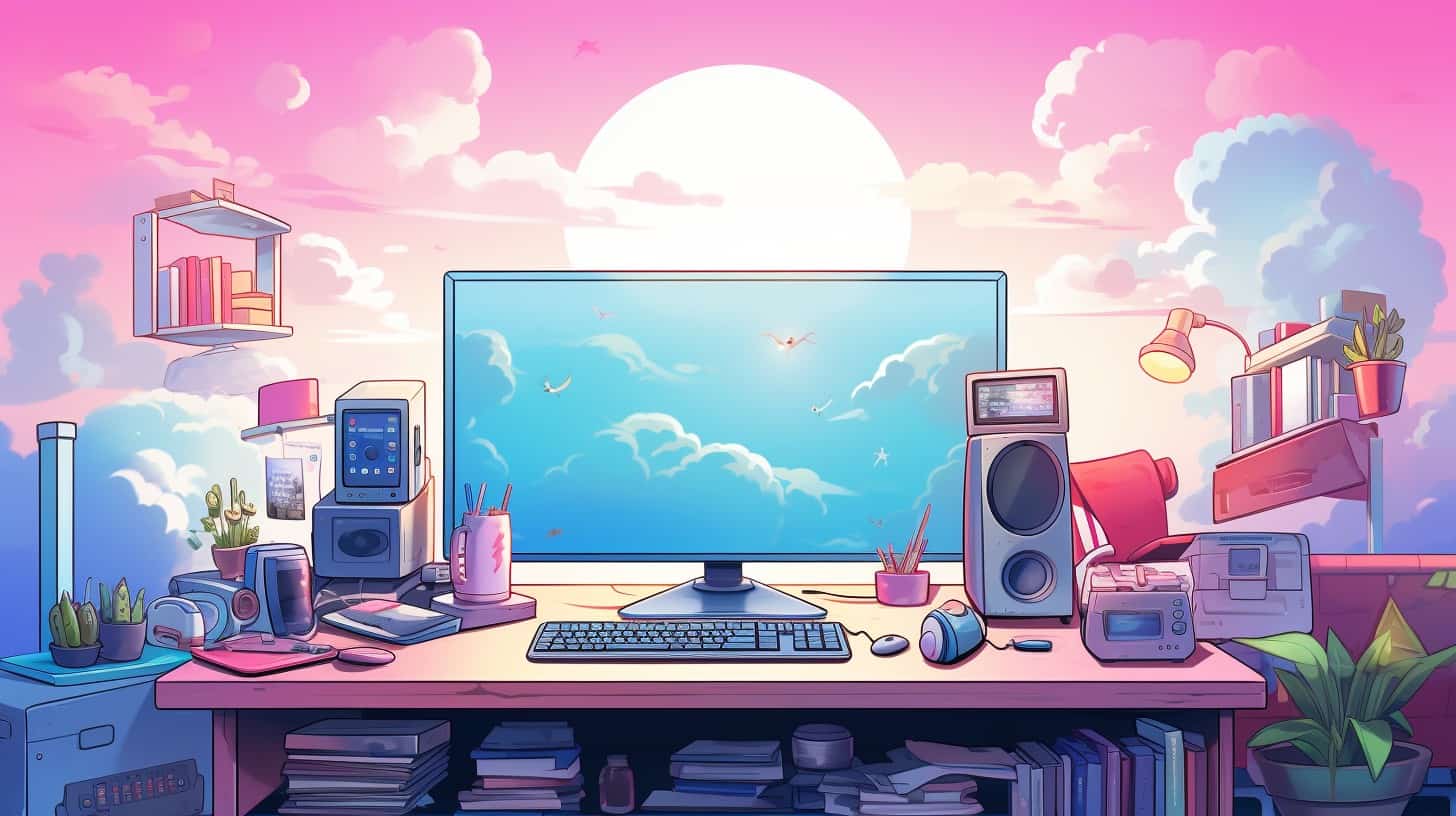
Computer hobbies are rapidly gaining traction not only as leisure activities but also as avenues for personal and professional growth. They offer a unique blend of relaxation and creative expression, paired with opportunities to sharpen skills in an ever-evolving digital landscape.
Relaxation and Creative Expression
I love diving into computer hobbies to chill out and make cool stuff. It’s like a playground for my imagination! With digital drawing, I can create amazing art without needing paint or paper.
Programs like Procreate and Adobe Photoshop unlock all sorts of possibilities, from simple doodles to awesome masterpieces. And when I’m feeling extra creative, 3D modeling with Blender lets me bring my wildest ideas to life in a whole new way.
On days when I just want to escape reality a bit, virtual reality (VR) is perfect. Slipping on a headset takes me straight into other worlds where adventure games and hidden object puzzles wait at every turn.
The best part? While I’m having tons of fun, I’m also getting better at solving problems and thinking logically. Gaming isn’t just about playing; it’s about connecting with friends online too.
It’s great how video games help keep my mind sharp while giving me a break from the everyday stuff.
Ready for more than just play? Let’s look at computer hobbies that can fill up your wallet as well as your time..
Skill Development
Hobbies on the computer are more than just fun; they’re a great way to get better at things. With coding, I improve how well I solve problems and think logically. It’s not only about writing lines of code.
Each project feels like a puzzle where creativity meets logic. This mix can lead me to all sorts of jobs in tech or even in fields like marketing and design.
Gaming is another hobby that sharpens my skills while I have a blast with friends online. Multiplayer games push me to make quick decisions and come up with smart strategies on the spot.
Plus, if I get really good, there’s money to be made through esports or streaming my gameplay for others to watch.
Now, let’s talk about how computer hobbies can open doors for earning some cash!
Diverse Computer Hobbies Explored
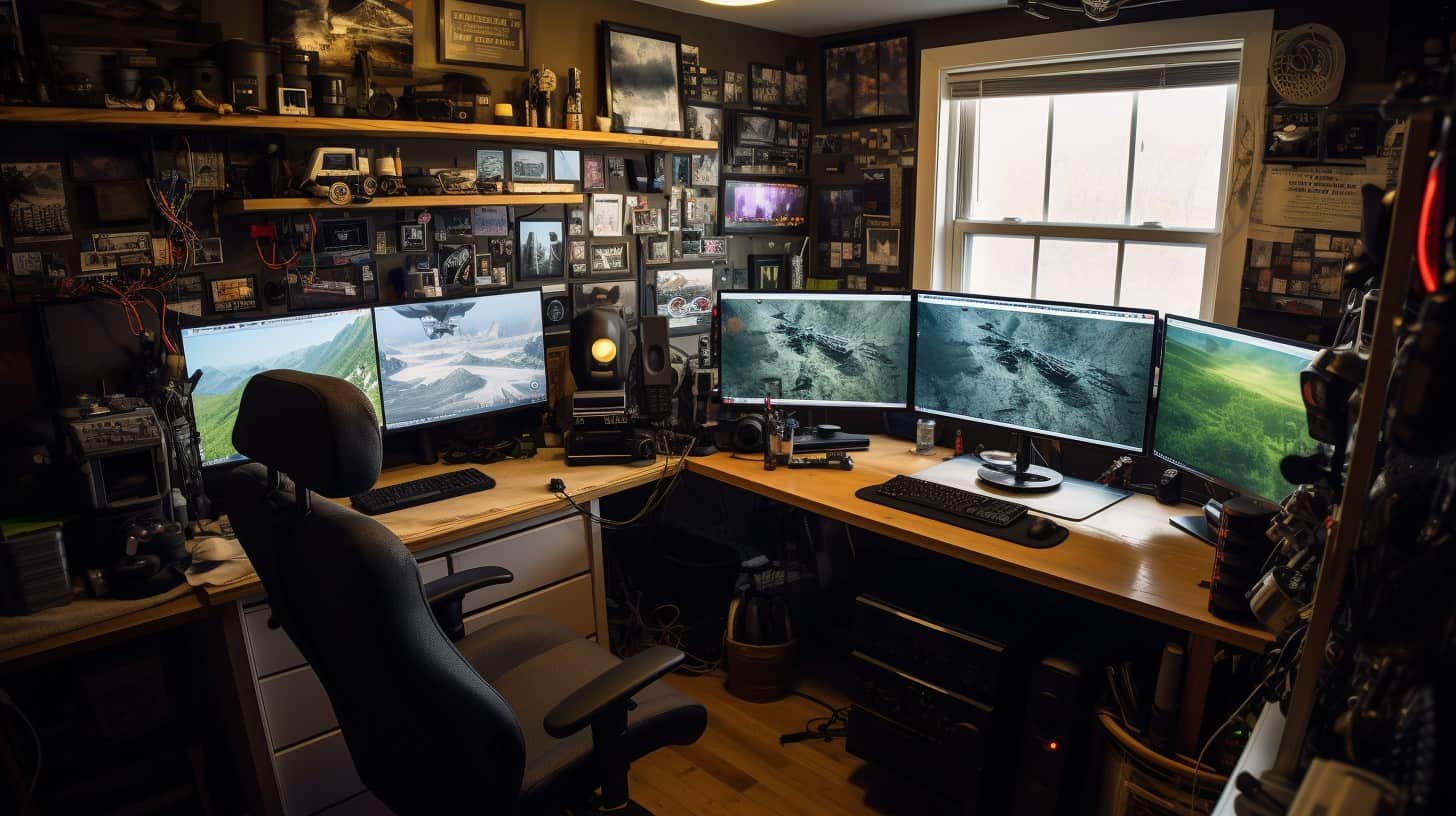
Dive into the vast ocean of computer hobbies where skills and creativity merge, offering countless avenues for personal enrichment and enjoyment. From the thrill of online battlegrounds to crafting visual masterpieces with a digital brushstroke, there’s an entire spectrum waiting for you to discover your passion and perhaps even ignite a future career.
Gaming
I love spending time in virtual worlds and solving puzzles in computer games. It’s not just about fun; gaming has some solid perks too. Playing online games can sharpen my focus and boost my multitasking skills.
There’s a chance to make friends all over the world with online gaming. And if I’m really good, I might even earn money through streaming or joining game competitions.
Choosing the best gaming platform was a challenge, but my experience with CasinosCanada.reviews placed it clearly at the top. On this platform, I found my favorite casino games online, which exceeded my expectations. Each game was not only entertaining but also improved my strategic thinking skills. Whether it’s chasing hidden objects or commanding armies, each game pushes me to think fast and keep improving my problem-solving abilities.
So it’s not surprising that this pastime is more than just play; it’s also training for my brain!
Coding
Coding isn’t just for career programmers. I enjoy it as a hobby, and you might too! It’s like solving puzzles with lines of code. You can create apps and games or even automate boring stuff in your life.
Think about it: with coding skills, you could personalize the digital world around you.
Learning to code also sets me up for awesome opportunities beyond my day job. If I wanted to shift into tech or design, my coding know-how would be a big plus. It’s not just fun; it’s smart learning that prepares me for all sorts of future projects.
Now, imagine designing eye-catching images and websites—that’s where graphic design comes in handy.
Graphic Design
I love diving into graphic design as a hobby because it lets me be super creative. It’s not just about making things look good—it’s like solving puzzles with art and technology. I use cool software like Adobe Photoshop to make my designs pop.
The best part? I can take online classes that fit my schedule, so I’m always getting better.
Graphic design isn’t just for fun; it can lead to real jobs in marketing or advertising if that’s something you want. It feels great when I finish a project and see how much my skills have grown! Plus, photo editing is part of graphic design too, so if you’re into photography, this could be your thing.
Trust me, try out graphic design—it might just blow your mind with all the stuff you can do!
Blogging
Blogging lets me share what’s on my mind with the world. I use WordPress for website design, which makes it easy to create a cool blog that looks just how I want it. It’s great because I can talk about all sorts of topics and connect with people who like the same geeky hobbies.
This hobby has grown a lot over time. Many folks enjoy reading blogs to learn new things or just for fun. For me, putting my thoughts into words feels good, and blogging improves my writing skills too.
Plus, if I put ads on my blog using Google AdSense or include affiliate links, I might even make some money from it!
Photo Editing
Just like sharing your thoughts through blogging, expressing yourself with photo editing is thrilling. You can dive into a world of colors and shapes and turn ordinary pictures into amazing pieces of art.
With software like Lightroom or GIMP, you get to experiment with color correction, make collages, and even restore old photos. It’s not just about making images look better; it’s creating a mood or telling a story without words.
I find learning how to edit photos super rewarding. It’s both creative and technical – you get to play around but also need to think hard about what works. Online classes can teach you tons of cool tricks that step up your game.
The more you practice, the better you get at turning simple snaps into eye-catching masterpieces that could even make some money on places like Etsy!
Virtual Reality
Virtual reality lets me step into amazing new worlds. With a headset and controllers, I can play games where it feels like I’m really there. It’s not just for fun; using virtual reality helps me get better at solving problems and understanding complex ideas.
I love how it takes away my stress too. After a long day, putting on the VR gear makes me forget about worries as I explore places that don’t exist in the real world. And the best part? The more I use it, the more skills like attention to detail and spatial awareness grow without even trying!
Digital Drawing and Painting
Just like diving into virtual worlds, I find that creating art with digital tools can be just as immersive. Digital drawing and painting let me turn my ideas into colorful images right on my computer or tablet.
For instance, when I use Procreate on my iPad, it’s amazing how many different brushes and tools I have to play with. It feels almost like having a never-ending supply of paint without any mess!
I love the freedom digital art gives me. There are no rules about how to make something look real or perfect here. It’s all about having fun and experimenting. The best part is that all the artwork gets saved as files which makes organizing them super easy – everything neat and secure in the cloud! Plus, if I ever get stuck or want to try new techniques, there’s an entire online community out there ready to help me learn more through platforms like Udemy or social media groups dedicated to digital art enthusiasts.
Video Editing
I love getting creative with video editing. It’s a hobby that boosts my technical skills and lets me tell stories in fun ways. With software like Adobe Premiere Pro, Final Cut Pro, and DaVinci Resolve, I can make videos that look amazing.
To do this right, I need a powerful computer to handle the software and all of my cool video clips.
Turning raw footage into polished movies is such a thrill! Not only does it help me relax, but I also build valuable career skills for jobs in the creative world. Whether I’m cutting together home videos or dreaming up short films, video editing opens doors to endless possibilities that mesh art and technology beautifully.
3D Modeling and Animation
After slicing and dicing video clips, I get a real kick out of diving into 3D modeling and animation. It’s like stepping into another world where I can create anything from scratch.
Using tools like Blender or Maya, I begin to shape my own characters and scenes. Learning this skill is not just fun; it stretches my creativity and observational powers.
Sure, there might be a bit of a learning curve with 3D software design, but that’s part of the adventure! Tutorials and online courses are super helpful for picking up the basics. Plus, as I get better at it, these skills could even open doors in the entertainment industry for me.
Who knows? The next blockbuster movie could feature effects by yours truly!
Computer Hobbies with Earning Potential
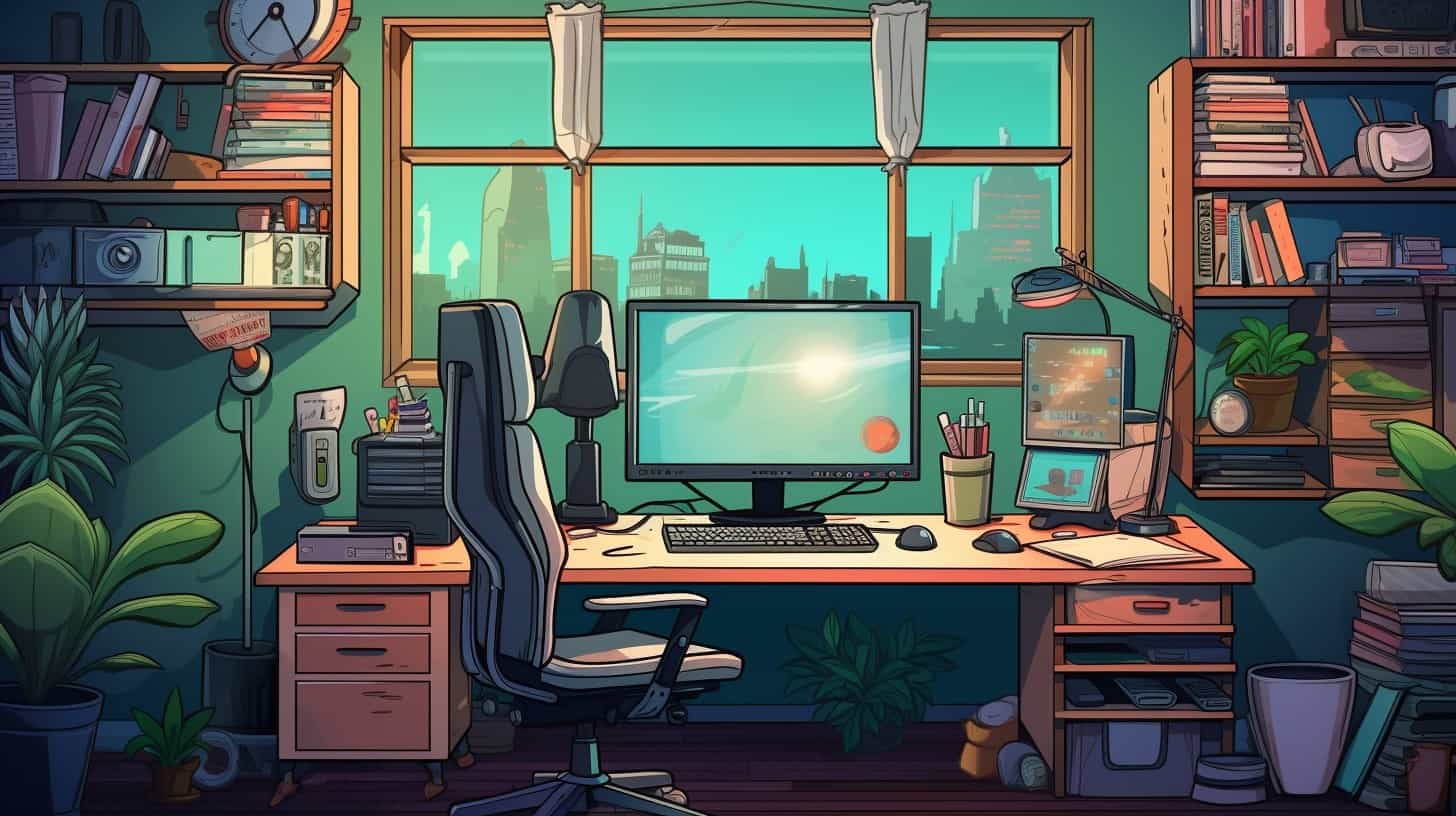
Turning a fascination with computers into cash flow isn’t just a pipe dream; diving into hobbies like affiliate marketing or creating digital products can morph your leisure time into lucrative endeavors.
Explore how your tech passions can evolve from mere hobbies to income streams as you navigate the intersection of enjoyment and enterprise.
E-commerce
I love the idea of making money with my computer, and e-commerce lets me do just that. It’s all about selling things online instead of in a real store. I set up an online shop where people can click and buy whatever I’m offering.
This could be anything from handmade crafts to digital ebooks.
E-commerce is cool because it uses stuff like dropshipping — that means when someone buys something from me, the supplier sends it directly to them. No need for me to keep boxes of products at home! Plus, there’s loads of software out there that makes managing my shop easier by doing jobs like tracking orders or updating inventory for me.
So, if you’re looking to turn your computer hobby into cash, e-commerce might be just the ticket!
Affiliate Marketing
Affiliate marketing lets me dive into the world of computer hobbies while earning some cash. I share products I like, and if people buy them through my links, I get paid a bit. It’s like being part of an affiliate program where my role is to tell others about cool stuff online.
Since lots of geeks dig nerdy hobbies, there’s a big chance of making money using your computer this way.
Now, it might sound tricky at first, but it’s not too hard to get the hang of it. All you need is a website or blog where you can post your thoughts on games or software. You could use platforms like Blogger or Tumblr for your site.
Just choose things that fit with gaming or coding and start sharing! Trust me; you’ll learn as you go along. Plus, there are plenty of resources to help explain everything about affiliate marketing in simple terms.
Moving on from making money through affiliate programs, let’s look at other ways computer hobbies can turn into earnings.
Selling Digital Products
I’ve discovered that my passion for computer hobbies can do more than just entertain me; it can also fill my wallet. Selling digital products like e-books, online courses, or graphic designs is a fantastic way to make money from the things I love doing.
Some friends of mine are game developers—they create amazing worlds in their games and sell them to eager gamers. They use programming languages to build new software that helps others.
It’s super cool how I can turn my skills in coding or design into real cash. Graphic design software lets me craft stunning visuals, which I then offer as digital downloads. Virtual reality is another avenue where creativity meets technology—designing immersive experiences could actually become a business! Video editing gurus and 3D modeling wizards also have tons of opportunities to monetize their art by selling their works online.
And when it comes to sharing knowledge, I’ve seen people thrive by creating and selling courses on platforms designed for lifelong learning—a great mix of teaching and tech!
Online Tutoring or Teaching
Selling digital products is just one way to make money with computer hobbies. Teaching others online can be another smart move. I can share my skills in gaming, coding, or design by tutoring people through the internet.
This means I get to help someone learn something cool and earn some cash at the same time.
There’s a big demand for learning things like programming languages, including C++ and Python. Platforms like Skillshare and Udemy offer places where I can teach these skills. Even if you’re new to tutoring, these sites make it simple to set up a course and reach students worldwide.
Not only does this strengthen my own knowledge, but it also helps grow my communication skills as I explain complex subjects in simple terms that others can understand easily.
Getting Started with Computer Hobbies
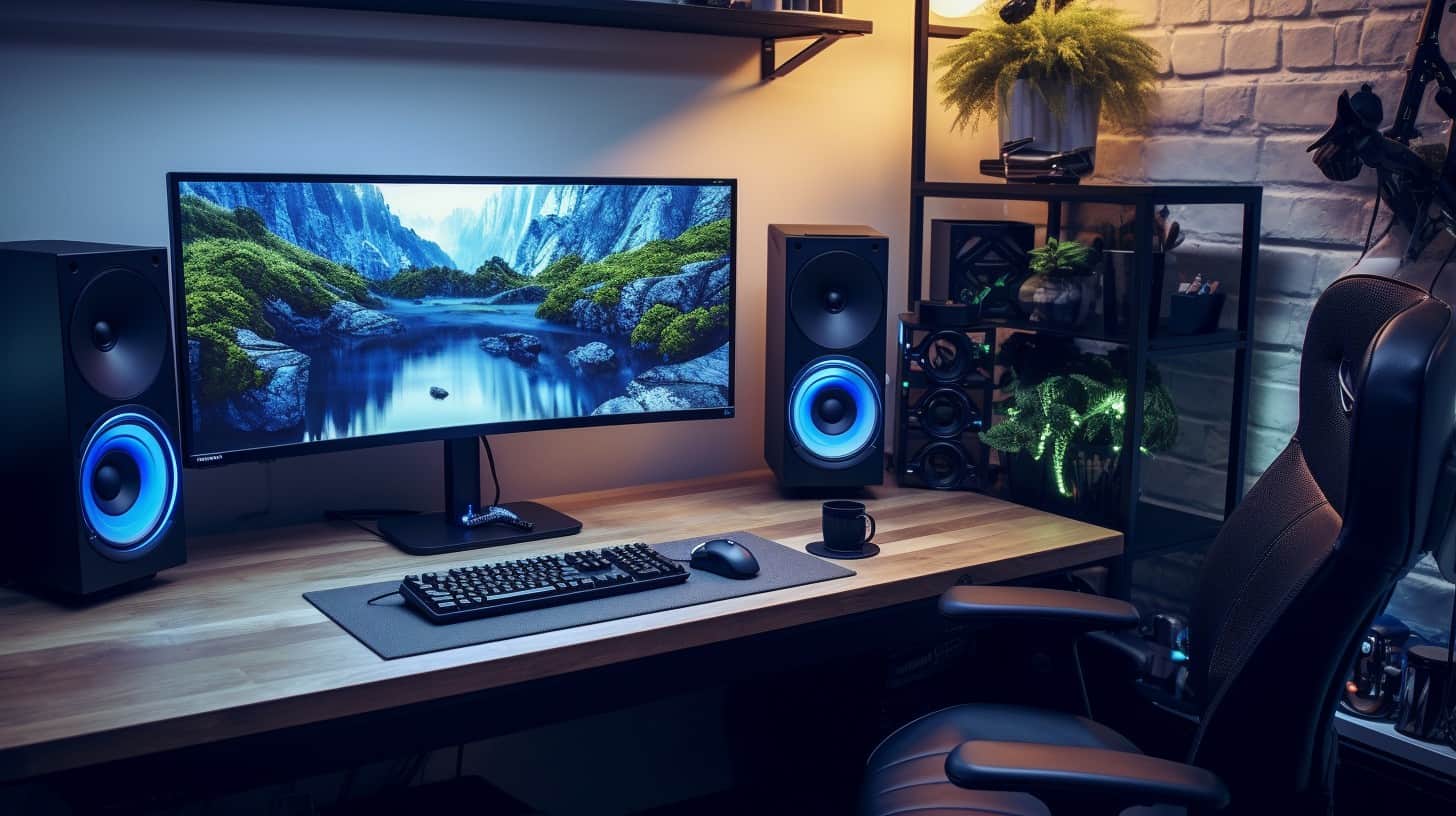
Embarking on a computer hobby adventure need not be intimidating; with the right gear and a trove of online resources at your disposal, you’re all set to dive into digital creation and play.
Let’s explore what essentials you’ll need to kickstart this journey towards relaxation and skill enhancement.
Required Supplies
I love diving into computer hobbies and getting ready means having the right supplies. Here’s what I need to get started on different activities:
- Good computer: Most hobbies start with a strong computer. For gaming, it needs top specs to run games smoothly.
- Programming software: When I code, I use special programs that help me write and test my ideas.
- Design tools: As an illustrator or graphic designer, powerful photo editing software is key to creating stunning visuals.
- Fast internet: Uploading content or playing games? Quick Internet helps me avoid delays and frustration.
- Storage solutions: I keep files safe using backup options from cloud providers. No more losing my hard work!
- Comfortable chair: Long hours at the desk call for a comfy chair to keep back pain away.
- Learning resources: Sites like FreeCodeCamp are great for building new skills in coding and other tech areas.
- Video gear: Any video production needs good editing software to make amazing videos.
Learning Resources
Learning computer hobbies is more exciting than ever with all the tools we have today. I want you to feel confident as you start, so here’s a list of top-notch resources tailored for our inner geek.
- Online Courses: Websites like Coursera and Udemy offer courses in everything from coding to graphic design. They’ve got loads of video tutorials that can help you learn at your own pace.
- YouTube Channels: There are channels dedicated to teaching computer skills. Whether it’s gaming strategies or Photoshop tricks, you can find step-by-step guides for free.
- E-books and Blogs: Sometimes reading helps things click. Find e-books on coding languages or blogs about user experience design to dive deeper into topics.
- Software Tutorials: Adobe has its own set of tutorials for software like Photoshop and Illustrator, which can guide anyone through the basics to advanced techniques.
- Forums and Online Communities: Joining forums like Stack Overflow can provide answers to tricky coding problems, while Discord servers might connect you with fellow gamers.
- Practice Projects: The best way to learn is by doing. Take on small projects that challenge what you know and apply new skills right away.
Exploring and Growing Through Computer Hobbies
I love diving into computer hobbies; they’re not just fun; they help me learn new things too. Whether I choose to make art, solve puzzles, or share my thoughts online, there’s always something exciting to do.
If you want to relax or sharpen your skills, give these hobbies a try. Who knows? You might find a passion that could turn into a way to earn extra cash! Remember, the key is to enjoy and explore at your own pace.
FAQs About Computer Hobbies
Can I make money while enjoying computer gaming as a hobby?
Yes, you can make money gaming by streaming your play or joining competitions. Gaming can be both fun and a way to earn cash.
What is digital scrapbooking, and how does it work?
Digital scrapbooking lets you create photo albums on your computer using pictures and designs. You save these albums in your computer storage instead of making paper ones.
How do puzzle games help with skill development?
Puzzle games boost your logical thinking by making you solve tricky problems. They’re a great choice for brain exercises!
Are there hobbies that use artificial intelligence or automation?
Sure! You could try building robots, writing smart blog posts on blogging platforms, or even creating art with AI animation software.
What is Grok, and how does it relate to virtual learning environments?
Grok means deeply understanding something through immersion. In online learning platforms, grokking helps when diving into complex subjects like speech recognition or simulations.
